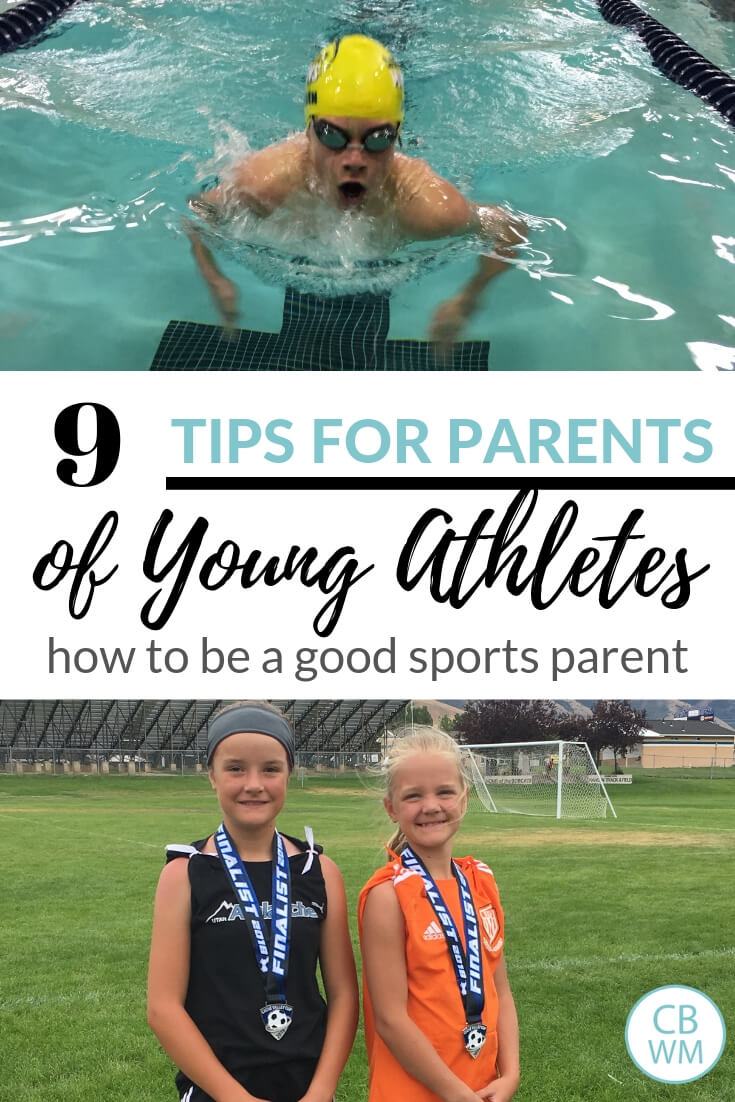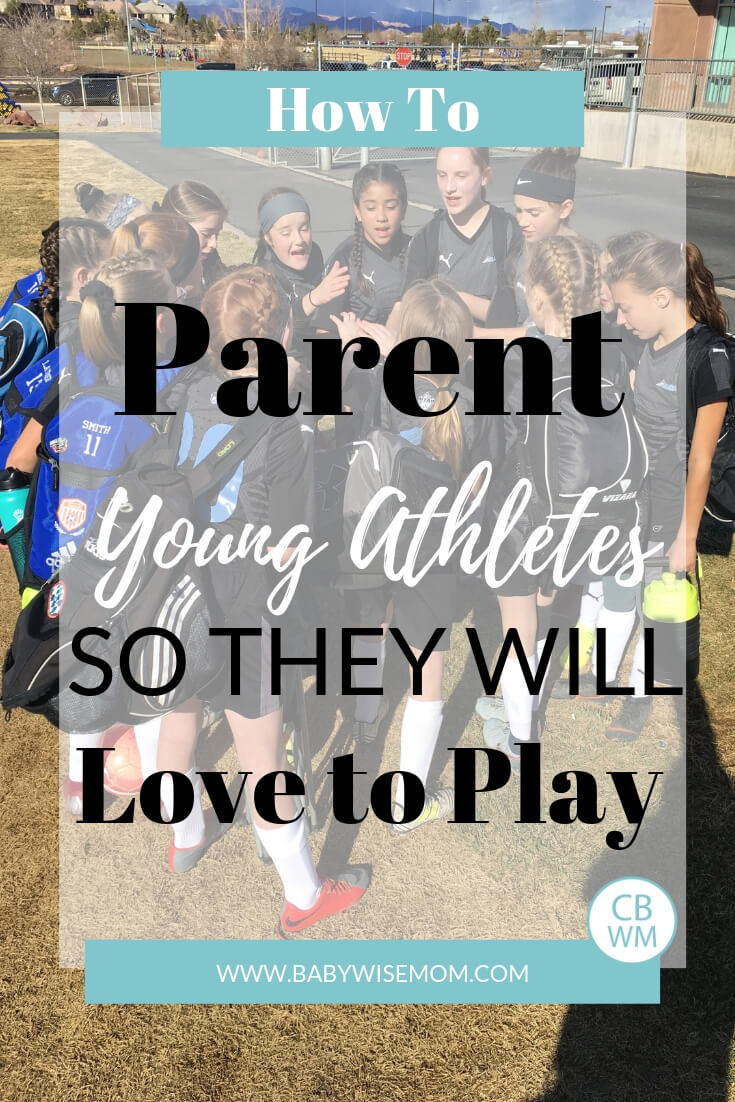How To Be a Good Sports Parent. Parenting young athletes. Know the role of parents in youth sports so you can best help your young athlete.

We parents really like to see our children succeed, and parents of young athletes are no different. This desire for our children to have the very best in life often leads us to pushing them and putting pressure on them to succeed. What we intend to be as encouragement often comes across as pressure to kids in sports.
I have had at least one child playing sports for about a decade now. My kids have (and do) played sports on a recreation level. I also have kids who play a sport on a competitive level. I have witnessed and learned all sorts of behavior over the years.
Read: Competetive Sports: The Good, The Bad, and the Real
As parents, we have a lot of influence over just how much our children ultimately enjoy participating in the sport. Many children who quit sports point to things their parents did or didn’t do as the main, or only, reason for quitting.
So what is our role as parents? How can we be a good sports parent? Here are some tips.
Post Contents
- Remember It Is Just a Game
- Do Not Coach from the Sideline
- Stay Positive, Cheer, and Encourage
- Do Not Be Embarassing
- Do Not Critique Play on the Drive Home
- Make “I Love to Watch You Play” Your Mantra
- Allow Young Athletes to Set Their Own Goals
- Respect the Coach, Team, and Refs
- Honor Effort, Not Results
- Conclusion
- Related Posts:
Remember It Is Just a Game
Even if your child is playing sports competitively or for the school team, always remember, it is just a game. Keep that in mind as you cheer, criticize, and react to what is going on during the game.
Do not let being a spectator of a game undo or negate important concepts you are trying to teach your child at home. You cannot teach your child on Friday all about how important it is to be kind to others and then berate a ref on Saturday for making a bad call.
Do not take the game too seriously. Do not be a jerk to the refs. Remember the grand scheme of life, what has lasting value, and what you really want your child to learn from participating in sports.
Good sportsmanship is a valuable lesson to learn in sports and apply in life. It will be hard for your young athlete to learn if you cannot model it yourself.
Do Not Coach from the Sideline
Every coach my kids have had on a competitive level of play has asked parents to not coach from the sideline. Do not tell a player to do something or not do something, even if it is your own child.
Some coaches do not like this because you are probably telling your child to do something totally different than what the coach has taught and instructed. This puts the child in an awkward position of needing to choose between listening to mom or listening to the coach.
Kaitlyn’s current soccer coach also does not like coaching from the sideline because he wants the players to learn to manage themselves during gameplay. Even he does not tell the soccer players if they are offsides or to shoot the ball. He wants them to learn by experience. He teaches and coaches at practice. They play during games. The reflect and evaluate after the game.
Stay Positive, Cheer, and Encourage
As you watch a game or event, be positive and cheer your child and teammates on. If you aren’t coaching, you can still clap, call out “Way to go!” and such things. Cheer for all of the players. Be encouraging to the whole team.
I have one mom friend who knows herself well enough that she distracts herself during games with some other task. It might be something as simple as scrolling Instagram. She knows she will get too involved yelling if she doesn’t keep herself multi-tasking.

Do Not Be Embarassing
Parents can really be embarrassing at games. You might yell at the ref so much you get kicked out. You might be criticizing your child so much that it starts to feel uncomfortable for all people watching.
There was one girl on a team of Kaitlyn’s once who finally yelled back at her critical father, “I’m trying dad!” The father is a loving man who wants the best for his child, but his constant telling his daughter to go faster and work harder had a negative effect.
Do Not Critique Play on the Drive Home
When you get in the car to drive home, do not list off all the ways your child could have or should have done better. Your child knows. He doesn’t need you to point it all out.
Do not spend the ride home complaining about the refs, criticizing the coach, or talking poorly of teammates.
Hundreds of college athletes surveyed said their worst memory of playing sports growing up was the ride home. The worst memory is with their parents!
This article really stresses the importance of the ride home.
Relax on the drive home. Do not try to live vicariously through your child. Doing so will lead you to be so invested in the outcome of the game that you can’t help but give a laundry list of problems from what you just witnessed.
Make “I Love to Watch You Play” Your Mantra
A couple of years ago I read an article on Facebook where the author talked about changing the car ride home to simply say, “I love to watch you play.” That was it.
The author talked about how much that changed sports for the child for the better (the child was a soccer player). I loved the concept and have tried to implement that myself.
Saying this, no matter the result of the game or event, releases pressure from the child. You just love to watch. Win or lose. Watching.
As parents, we think it is our job to always be teaching. After a race at a swim meet, we will take the child aside and teach the child what could have been done better. Do you know whose job that is? The coach. If you are not the coach, it is not your job unless your child asks for feedback.
Your job is to love to watch your child swim. First or last place, you love it.
I love this article for more thoughts on this.
Allow Young Athletes to Set Their Own Goals
Let your child set his or her own goals. Do not impress goals upon them–those are your goals. Let your child set goals.
You can help your child talk through the goals. You can encourage your child to set goals if the coach hasn’t done so. Just be cautious that you let the child set the goals.
Respect the Coach, Team, and Refs
Always respect the coach, team, and refs. Do not question the coach in front of your child. Do not criticize teammates. Do not complain about how horrible the refs were.
All of these people are human and will make mistakes. Sometimes the coach had a long-term vision you do not see that is driving decisions you do not understand.
The teammates are just children and deserve grace just as your child deserves grace. The opposing team is made up of children and not villains.
The refs are humans who won’t call everything the way you see it.

Honor Effort, Not Results
Be wary about how you respond after a game or event. It is easy to be excited an animated after things go well and to be quiet and disappointed after things go poorly.
Try to respond the same after a win or a loss. It is only a game. Remember “I love to watch you play.” If your child put in great effort and was respectful to others while doing it, that is cause for satisfaction from you.
If your child is disappointed after a loss or mistake, and wants to talk about it, talk about ways your child can put in full effort next time. Set goals for improvement. Does more effort need to go in during practice? Does your child need a better night sleep before the next game? Again, let the child set the goals.
Maybe the child put in full effort. Praise that effort. Allow your child to feel. Encourage your child to learn from it and move forward. Sometimes we give it all we have and it still isn’t enough. This is a valuable life lesson for kids in sports.
Conclusion
These 9 tips can help you be a good sports parent. This is a time when you do not have to teach and correct your child. You get to step back and just enjoy watching your child play.
